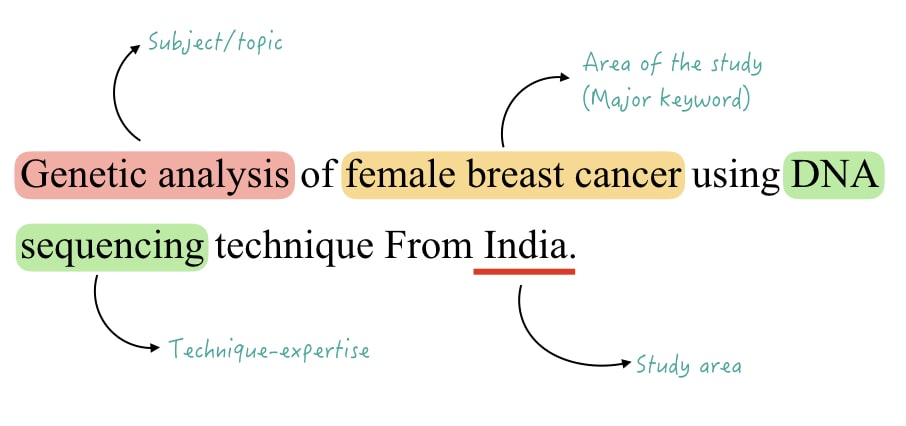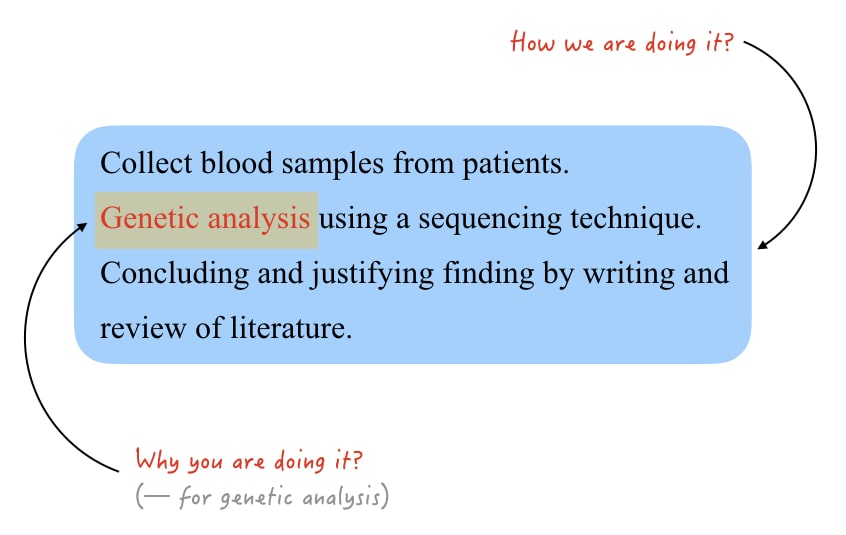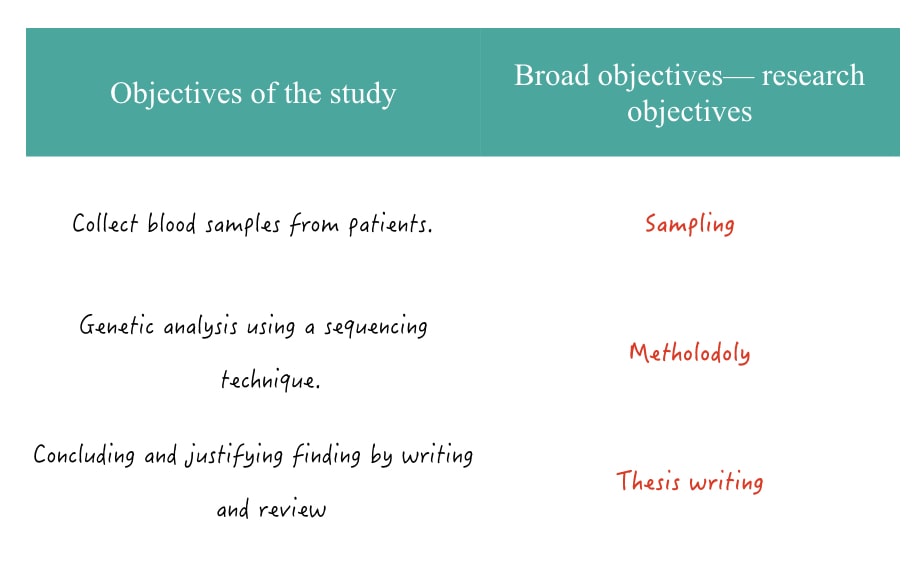“The aim of a PhD/ research is to explain what you are doing, while the objectives explain why and how you are doing it. Tasks/goals are kind of milestones towards your PhD. Let’s understand each one elaborately.”
Let’s start with an example,
Suppose I have given you a topic, let’s say— ‘breast cancer’ and tell you to do research. You go and come back to me after some years with the conclusion that breast cancer is sometimes passed on from the mother.
Does it make any sense? Absolutely not. Breast cancer itself is a huge topic and how the present conclusion has been obtained is questionable too, here in this scenario. Now focus here. Let’s go with another scenario.
I am giving you a topic– ‘Genetic analysis of female breast cancer patients.’ What you have to do is,
- Collect blood samples from patients.
- Do a genetic analysis using a sequencing technique.
- Conclude your finding with justifications in the form of a written draft.
That makes sense, right? You can do it. Here the “topic” that I have given is the aim of the study while the tree list points are the objectives using which you can design and justify your study.
What are you doing? -Genetic analysis of female breast cancer patients.
Why and how you are doing? -By a collection of blood samples from patients, genetic analysis using sequencing and concluding findings with written justification.
Let’s dive deep into the topic and understand what the research aim and objectives are along with goals/tasks. The sheer ‘aim’ here to write this article is to make understand the concept of each terminology, why it’s important and how you can correctly use it.
Related article: A Definite Research Process for PhD- What Students Should Know?
What is the research/ PhD aim?
The aim is, simply we can say– our thesis title or research title, more technically. It’s a sentence stating a problem to investigate. It should be
- Clear and concise
- Short and understandable
- Simple and effective
- Within our topic or subject area
- Include our research interest as a major keyword
- Includes an area of study
- Include the technique to be used.
- Includes population, region or territory in which the study would be conducted.
Check out this image to learn more. Prepare your own aim for your study and let me know in the comment section.

What are the research/PhD Objectives?
I define the objectives in two different ways. One– The objectives of the study and two– objectives of the research (broad objectives). Keep in mind that both are similar, technically.
Your research objectives tell a lot about your research.
Put simply, research objectives tell us how and why you are doing the research. Or more precisely, it’s the way or steps using which we would answer our research question. It indeed tells how we would achieve our research goals– each.

Objectives narrow down (define the scope) our study to an achievable measure. Take the present example further– breast cancer can be studied by mammography, CT-scan, chest X-ray, NMR and DNA testing, but we have chosen DNA testing (DNA sequencing)only.
Likewise, there are many analyses for breast cancer– genetic, etiological, structural, tumor analysis, etc but we only have chosen genetic analysis, only. Such boundaries as objectives give direction to your research.
Coming to the interesting point– the research or bros objectives. Catch this,
An image tells a thousand words. Now you might understand what I am trying to say. So the broad objectives of any research would be— sampling, methodology, Writing, etc. Using such broad objectives you can define or state your study objectives, concisely.
Broad research objectives have crucial importance as it later divides into tasks or goals. Actually, I divided objectives into tasks– you can also call them ‘goals’ too, that’s totally up to you. This will help you to structurize and organize your work and prepare the GANTT chart.
Check out the broad objectives of the research.
| Broad research objectives | Tasks to be completed |
| Pre-preparation | Project, synopsis, and title preparation and submission. |
| Sampling | Ethical approval, consent, sampling etc. |
| Methodology | Technique, process, and SOP to be used for the research. |
| Testing | Validation, optimization and preparation for sample testing. |
| Writing | Review writing, thesis writing, and research paper writing. |
| Results | Data collection, data processing and data interpretation. |
| Submission | Thesis completion, proofreading, submission and viva. |
Research goals/tasks:

We can include such a broad research objective in our study objective, but not each task or goal which can’t make sense or unnecessarily lengthen the section. For example,
Apply for ethical approval
Take written consent
Collect blood samples.
Instead, it’s better to write only,
Collect blood samples following standard guidelines.
Now you may have a question, why do we have bifurcated your objectives into the individual task? Why is it important?
Research is more about planning than doing only research. When you plan things— into small milestones, it becomes achievable. For example, if our objective is Blood sample collection. We divided it into tasks like— ethical approval, consenting and sampling.
In addition, we give a specific timeframe to each task– For instance, 6 months for ethical approval, one month for patient consent and 3 months for sampling. Now, the probability of your success greatly increases.
And thus it’s required.
We use this system to prepare 5 types of GANTT charts for PhD and make a micro-management plan. This is our— you can say, ‘mantra’ to success. When you follow this GANTT chart, you will also get success, surely.
This is our proven and tested theory for success, however, in the entire process, the GANTT chart plays a crucial role. You can download and use our GANTT chart from here.
Wrapping up:
Research planning is a critical step in PhDs, not even students, sometimes even their guides can’t give students a proper direction and research plan template. And in my opinion, they can’t because they are busy people.
You have to manage such things by yourself. How to plan and whose help you take is totally up to you. Remember, a guide can only help you in your research and only when you have a proper plan.
You can drop a mail for one-on-one coaching, guidance and proper planning for your PhD. Our team is always ready to help you. Don’t drop your doctorate. Do check out our GANTT chart. And buy it.
I hope this article makes sense to you. Share it and bookmark the page.




